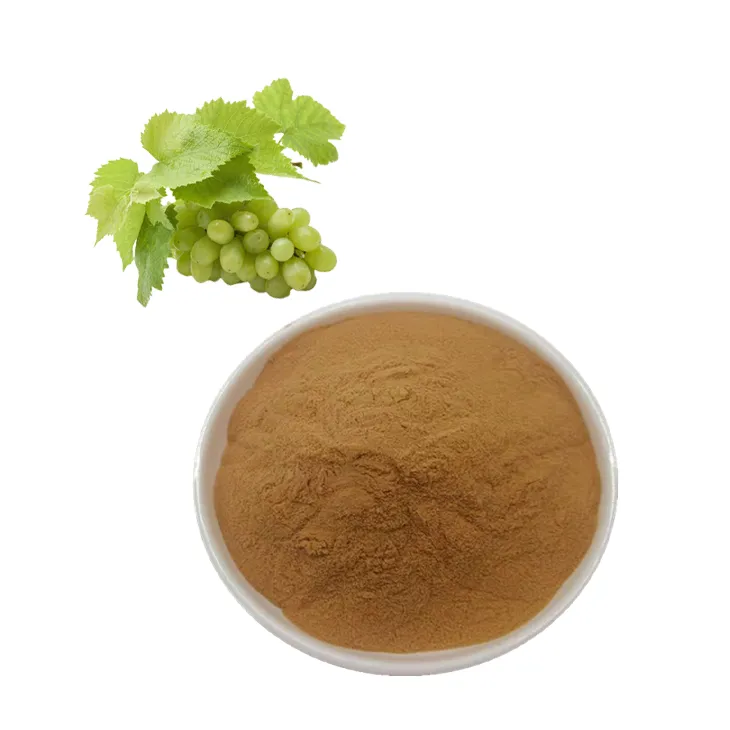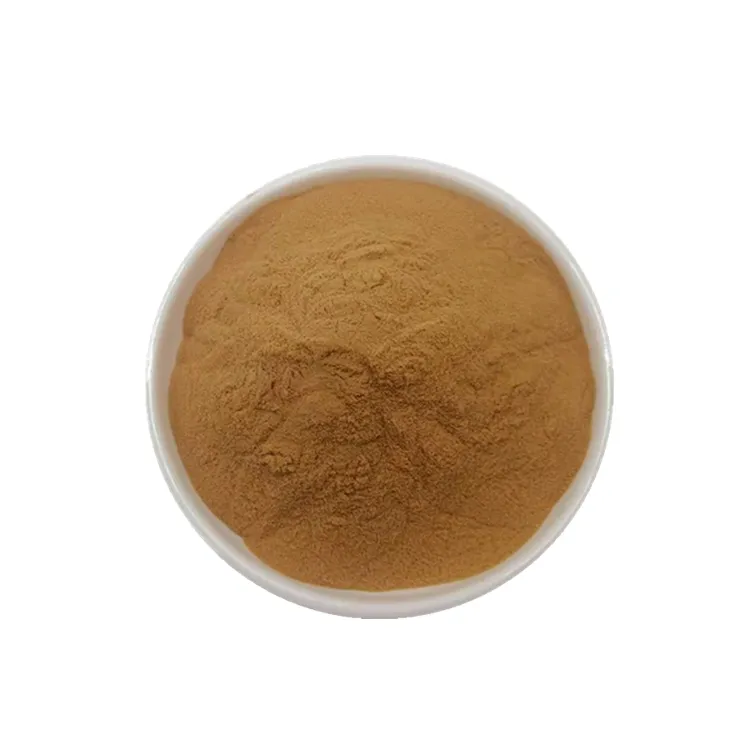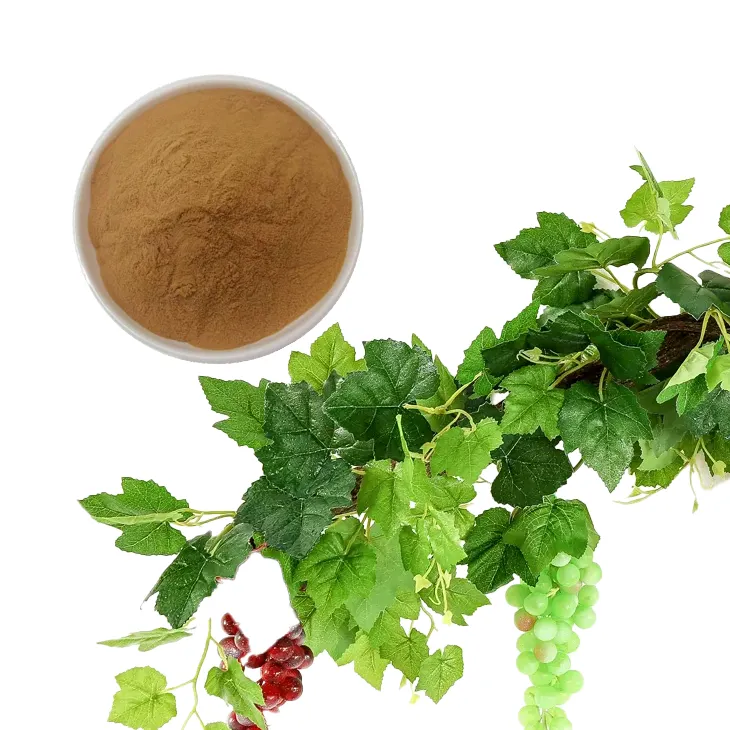- 0086-571-85302990
- sales@greenskybio.com
Does grape leaf extract have benefits for diabetes? Are these all safe and applicable for diabetic patients?
2024-11-12

1. Introduction
Diabetes mellitus is a chronic metabolic disorder that affects millions of people worldwide. Management of diabetes often involves a combination of lifestyle modifications, medications, and in some cases, natural supplements. Grape Leaf Extract has recently emerged as a potential natural remedy for diabetes. This article aims to explore the potential benefits of Grape Leaf Extract for diabetes and comprehensively assess its safety for diabetic patients.

2. Chemical Composition of Grape Leaf Extract
Grape leaves contain a variety of bioactive compounds that may contribute to its potential effects on diabetes. These include:
- Polyphenols: Such as flavonoids (e.g., Quercetin, kaempferol) and phenolic acids. These compounds are known for their antioxidant properties. Antioxidants play a crucial role in diabetes as they can help reduce oxidative stress, which is often elevated in diabetic patients.
- Tannins: Tannins in grape leaves may have a role in modulating glucose metabolism. They can interact with digestive enzymes and affect the absorption of carbohydrates.

3. Potential Benefits for Diabetes
3.1. Glucose Regulation
One of the main areas of interest is the effect of grape leaf extract on glucose levels. Some studies suggest that:
- It may enhance insulin sensitivity. Insulin is a hormone that is crucial for the uptake of glucose by cells. In diabetes, insulin resistance is a common problem. Grape leaf extract could potentially improve the cells' responsiveness to insulin, allowing for better glucose uptake and utilization. For example, flavonoids in the extract might activate certain intracellular signaling pathways that are involved in insulin action.
- There is also evidence to suggest that grape leaf extract may inhibit certain enzymes involved in carbohydrate digestion. By doing so, it can slow down the breakdown of complex carbohydrates into simple sugars, thereby reducing the post - meal spike in blood glucose levels. This is similar to the mechanism of action of some anti - diabetic drugs.
3.2. Anti - oxidative Effects
As mentioned earlier, grape leaf extract is rich in antioxidants. In diabetes:
- Oxidative stress is increased due to factors such as chronic hyperglycemia (high blood glucose levels) and abnormal lipid metabolism. This oxidative stress can damage cells, including pancreatic beta - cells which are responsible for insulin production. The antioxidants in grape leaf extract can scavenge free radicals and reduce oxidative damage. For instance, Quercetin has been shown to protect pancreatic beta - cells from oxidative stress - induced apoptosis (cell death).
- By reducing oxidative stress, grape leaf extract may also have a positive impact on the long - term complications of diabetes. Diabetic complications such as neuropathy (nerve damage), retinopathy (eye damage), and nephropathy (kidney damage) are often associated with oxidative stress - mediated damage to tissues.
3.3. Lipid Profile Improvement
Some research indicates that grape leaf extract may have beneficial effects on lipid metabolism in diabetic patients:
- It may help reduce levels of triglycerides, which are often elevated in diabetes. High triglyceride levels are associated with an increased risk of cardiovascular diseases, a major complication of diabetes. The mechanisms underlying this effect may involve the modulation of lipid - synthesizing enzymes in the liver.
- There is also evidence that grape leaf extract can increase levels of high - density lipoprotein (HDL) cholesterol, often referred to as "good" cholesterol. Higher HDL levels are associated with a lower risk of heart disease. This could be due to the antioxidant and anti - inflammatory properties of the extract, which can protect HDL particles from oxidative modification and improve their functionality.

4. Safety Considerations
4.1. General Safety
Grape leaf extract is generally considered safe when consumed in moderation. However:
- Some individuals may be allergic to grape products, and in such cases, grape leaf extract should be avoided. Allergic reactions can range from mild symptoms such as skin rashes and itching to more severe reactions like difficulty breathing and anaphylactic shock.
- There is limited information on the long - term safety of high - dose grape leaf extract consumption. While short - term studies have not reported significant adverse effects, long - term use may pose unforeseen risks. For example, it could potentially interact with other medications or affect liver or kidney function over time.
4.2. Interaction with Medications
Diabetic patients are often on multiple medications, and it is crucial to consider potential interactions between grape leaf extract and these drugs:
- Antidiabetic medications: Grape leaf extract may potentiate the effects of some antidiabetic drugs, such as sulfonylureas. This could lead to hypoglycemia (low blood glucose levels), which can be dangerous. For example, if a patient is already taking a sulfonylurea to lower blood glucose and starts taking grape leaf extract without proper medical supervision, their blood glucose levels may drop too low.
- Blood - thinning medications: Grape leaf extract contains compounds that may have anti - platelet activity. If taken in combination with blood - thinning medications like warfarin, it could increase the risk of bleeding. This is because both the extract and the drug can interfere with the blood - clotting process.
4.3. Special Considerations for Diabetic Patients
For diabetic patients specifically:
- Those with kidney problems should be cautious when using grape leaf extract. Since the kidneys are involved in the excretion of the compounds in the extract, impaired kidney function may lead to the accumulation of these substances in the body, potentially causing adverse effects.
- Diabetic patients with hypoglycemic unawareness (a condition where patients do not feel the symptoms of low blood sugar) need to be especially careful. As grape leaf extract may further lower blood glucose levels, these patients may be at a higher risk of experiencing severe hypoglycemic episodes without realizing it.
5. Conclusion
Grape leaf extract shows potential benefits for diabetes in terms of glucose regulation, antioxidant effects, and lipid profile improvement. However, its safety for diabetic patients is a complex issue. While it may be generally safe in moderate amounts, there are potential risks associated with allergies, long - term use, and interactions with medications. Diabetic patients should always consult their healthcare providers before starting to use grape leaf extract as a complementary treatment for diabetes. This will ensure that the potential benefits are maximized while minimizing the risks associated with its use.
FAQ:
Question 1: What are the potential benefits of grape leaf extract for diabetes?
Grape leaf extract may have several potential benefits for diabetes. It may help in regulating blood sugar levels. Some components in the extract might enhance insulin sensitivity, which is crucial for diabetics as it allows cells to better respond to insulin and thus regulate glucose uptake. Additionally, it may possess antioxidant properties that can protect cells from oxidative stress, which is often elevated in diabetic patients and can contribute to various complications.
Question 2: How does grape leaf extract regulate blood sugar?
The exact mechanism by which grape leaf extract regulates blood sugar is not fully understood. However, it is hypothesized that certain bioactive compounds in the extract may interact with cellular signaling pathways involved in glucose metabolism. For example, it might influence the activity of enzymes involved in glycogen synthesis or breakdown, or affect the function of glucose transporters in cells. Some studies also suggest that it could modulate the release of insulin from pancreatic beta - cells, although more research is needed to confirm this.
Question 3: Is grape leaf extract safe for all diabetic patients?
While grape leaf extract may offer potential benefits, it is not necessarily safe for all diabetic patients. Some individuals may be allergic to components in the extract, which can cause allergic reactions ranging from mild skin rashes to more severe anaphylactic shock. Also, if a diabetic patient is taking other medications, there could be potential interactions. For example, it might interfere with the effectiveness of blood - thinning medications or drugs used to control blood sugar. Therefore, it is essential for diabetic patients to consult their healthcare provider before using grape leaf extract.
Question 4: Can grape leaf extract replace diabetes medications?
No, grape leaf extract cannot replace diabetes medications. While it may have some beneficial effects on blood sugar regulation and other aspects related to diabetes, it has not been proven to be as effective as established diabetes medications. Diabetes medications are specifically formulated and tested to control blood sugar levels within a target range. Grape leaf extract can, at best, be considered as a complementary approach, but it should not be used as a substitute for prescribed medical treatment.
Question 5: What is the recommended dosage of grape leaf extract for diabetic patients?
There is currently no standardized recommended dosage of grape leaf extract for diabetic patients. Dosage can vary depending on factors such as the form of the extract (e.g., capsule, tincture), the concentration of active compounds, and the individual patient's health status. Since the safety and effectiveness of different dosages have not been well - established, it is again crucial for diabetic patients to consult with their healthcare provider before starting any supplementation with grape leaf extract.
Related literature
- The Effects of Grape - Leaf Extract on Glucose Metabolism in Diabetic Rats"
- "Antioxidant Properties of Grape Leaf Extract and Their Potential Role in Diabetes Management"
- "Safety and Efficacy of Herbal Supplements, including Grape Leaf Extract, in Diabetic Patients"
- ▶ Hesperidin
- ▶ citrus bioflavonoids
- ▶ plant extract
- ▶ lycopene
- ▶ Diosmin
- ▶ Grape seed extract
- ▶ Sea buckthorn Juice Powder
- ▶ Beetroot powder
- ▶ Hops Extract
- ▶ Artichoke Extract
- ▶ Reishi mushroom extract
- ▶ Astaxanthin
- ▶ Green Tea Extract
- ▶ Curcumin Extract
- ▶ Horse Chestnut Extract
- ▶ Other Problems
- ▶ Boswellia Serrata Extract
- ▶ Resveratrol Extract
- ▶ Marigold Extract
- ▶ Grape Leaf Extract
- ▶ blog3
-
High purity olive leaf extract
2024-11-12
-
Lavender oil extraction method
2024-11-12
-
100% organic virgin sea buckthorn fruit oil
2024-11-12
-
Lotus leaf extract powder factory in China
2024-11-12
-
China aged garlic extract supplier
2024-11-12
-
Deer antler extract powder manufacturer
2024-11-12
-
Saw palmetto extract vs whole herb
2024-11-12
-
Phellodendron Extract
2024-11-12
-
Phyllanthus Emblica Extract
2024-11-12
-
Garcinia Cambogia Extract
2024-11-12
-
Tinospora cordifolia extract
2024-11-12
-
Hawthorn powder
2024-11-12
-
Dandelion Root Extract
2024-11-12
-
Eucommia Ulmoides Extract
2024-11-12
-
Lemon Balm Extract
2024-11-12
-
Calendula Extract
2024-11-12
-
Hawthorn Extract
2024-11-12





















